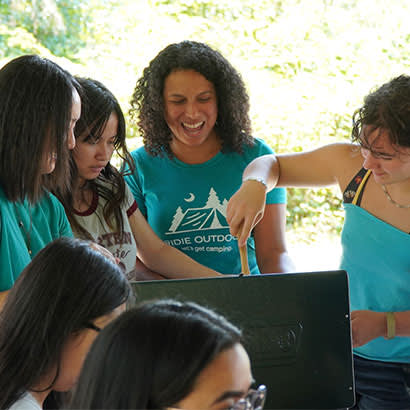
Pictured: Individuals cook on a camp stove. Photo credit: Fridie Outdoors
My own journey into outdoor recreation and environmental stewardship began in the heart of our city parks. My African American mother and I walked to the local park near our apartment and my Indonesian father cheered me on when I rode my little red tricycle. But when I was 11 years old, my parents passed away and I moved in with family. It was then that I was introduced to hiking — and I hiked to heal.
I was inspired by the impact that nature had on me and graduated from UC Berkeley with a Bachelor of Science in Environmental Economics and Policy. Those early experiences at the parks and on trails provided space to connect with my deepest wants and needs, to nature, and to the friends and family with whom I shared these experiences. Every time I got into nature, I’d learn something new, particularly about the impact I wanted to make through my career and ideate on all the paths to get there.
This is the power we want to unlock for today's youth. We want to provide them with the experiences and skills to connect with nature and discover the difference they want to make in school and through their work. Because when young people connect with the environment, they gain the space to discover who they want to be and begin charting a path to get there.
When I started Fridie Outdoors, an outdoor ed-tech startup empowering people to get camping and outdoors through personalized skill building, I knew how we grew would be just as important as what we did. As a result, we’ve both increased camping and outdoor participation, and in parallel provided paid internships for students and entry-level jobs for recent college graduates.
Every internship and hire gets hands-on experience with transferable skills, such as:
- Innovating for Change: We invite students to identify new opportunities to design for increasingly diverse outdoor participation. Every person has the potential to be an innovator in the outdoor and environmental fields, and it starts young, knowing how to identify and design for the change we want to create.
- Critical Thinking: We encourage students to gather and analyze data, evaluate what it means, and think critically about what to do in the short- and long-term based on these insights. The most pressing issues facing the world and communities need critical thinking to understand what is happening and why to come up with solutions.
- Project Management: We provide opportunities to develop essential project management skills from planning and executing projects. Owning projects from end to end helps us understand what it takes to not only come up with ideas, but to also see them through to implementation and impact.
Given 86 percent of Gen Z want purpose-driven work, it’s been important to ensure every role has synergy between their expressed interests and our organizational needs. Collectively, when every organization and company creates not just jobs, but career pathways to make a meaningful difference, we tap into people's deepest reason for working. Understanding that deepest level of motivation is what will cultivate the next generation of outdoor leaders, environmental stewards, and innovators of solutions that will solve the most complex and challenging issues facing society and the planet.
Interested in learning more about workforce development alongside peer park and recreation agencies? Check out NRPA’s Workforce Development Community of Practice. Applications are open through March 10!
Lestarya Molloy is the founder of Fridie Outdoors.
This blog post is part of a multi-part virtual learning series highlighting park and recreation workforce development programs across the country. For more stories like this, check out the following blog posts:
- Recreation as a Gateway to Youth Workforce Development
- Empowering At-Risk Youth Through Workforce Development in Recreation
- Sowing Seeds of Stewardship: Cultivating Youth Conservation Leaders in Taos, New Mexico
- Five Ways to Expand Accessibility in Outdoor Workforce Development
- Mastering Essential Skills in Park and Recreation-Based Workforce Development


